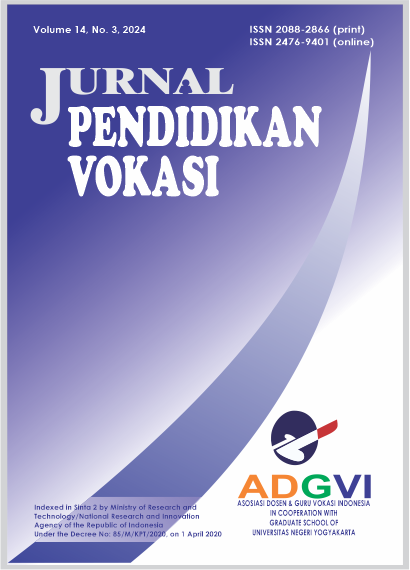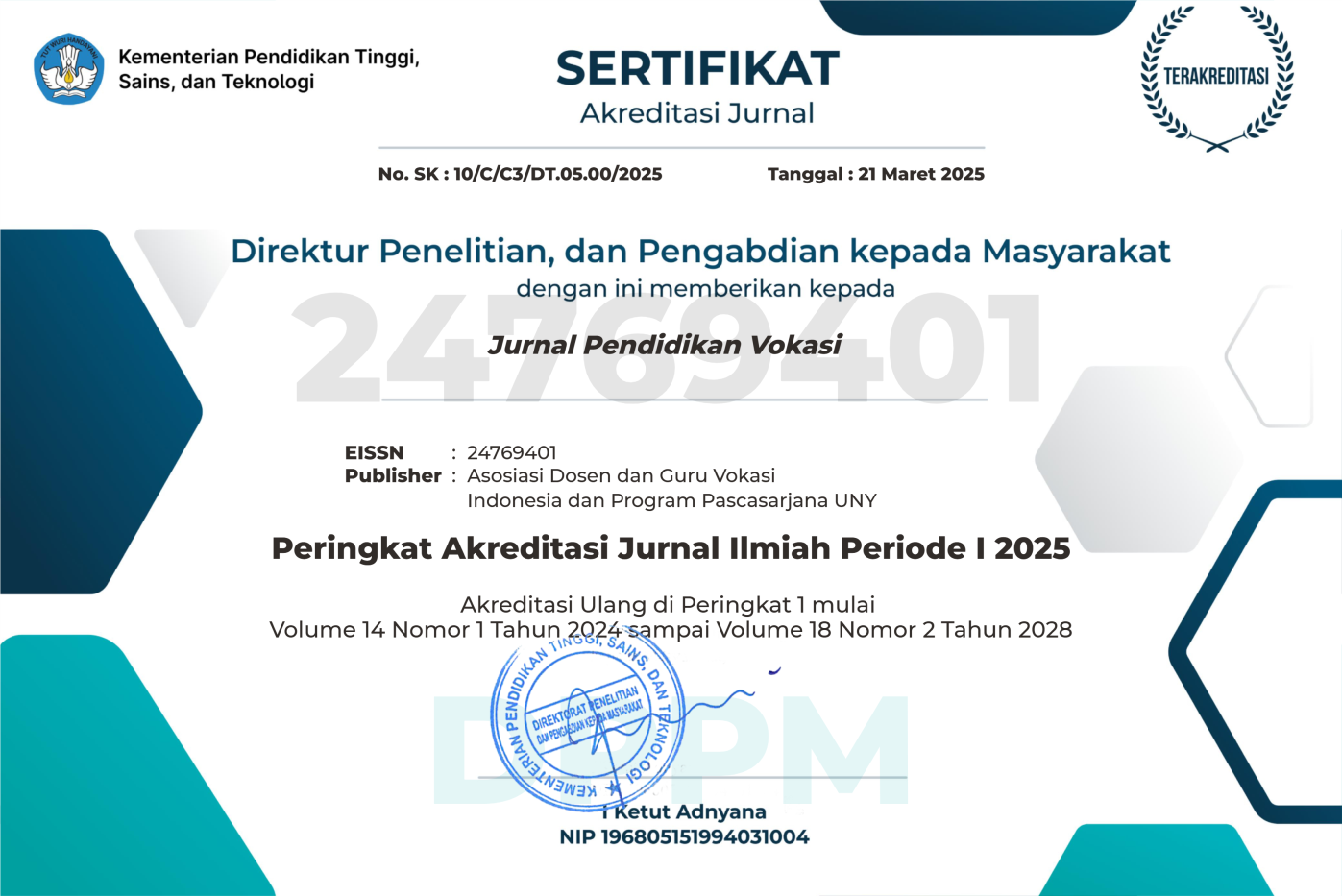Digital maturity models and instruments for vocational high schools in Indonesia
DOI:
https://doi.org/10.21831/jpv.v14i3.72957Keywords:
Digital maturity, Digital transformation, Measurement instrument, Vocational education, Vocational high schoolsAbstract
Research on digital maturity models in education, particularly vocational education, remains limited, despite the urgent need for schools to adapt to digital transformation. Vocational High Schools (SMK) in Indonesia are mandated to prepare graduates as skilled workers ready to meet industry demands, and therefore require a clear framework to assess their digital readiness. This study aims to develop a model and an instrument to measure the digital maturity level of vocational schools. The research employed a literature review of existing digital maturity models from both education and industry, followed by synthesis and adaptation to the vocational school context. The resulting model consists of five dimensions: strategy and organization, people and culture, products and services, technology and infrastructure, and organizational operations. It defines five levels of maturity: not ready, initial readiness, medium readiness, mature readiness, and fully applied. An instrument with 29 indicators was developed and tested through a pilot study in one vocational school, with results showing strong validity and reliability (Cronbach’s Alpha = 0.935). The findings highlight the inclusion of the products and services dimension as a novel contribution compared to existing educational models. This model and instrument provide practical benefits for vocational school leaders to assess current digital maturity, identify areas for improvement, and plan targeted digital transformation strategies. The study also opens avenues for future research through larger-scale validation and integration of field observations.
References
Astuti, M., Arifin, Z., Nurtanto, M., Mutohhari, F., & Warju, W. (2022). The maturity levels of the digital technology competence in vocational education. International Journal of Evaluation and Research in Education (IJERE), 11(2), 596. https://doi.org/10.11591/ijere.v11i2.22258
Awdziej, M., Jaciow, M., Lipowski, M., Tkaczyk, J., & Wolny, R. (2023). Students digital maturity and its implications for sustainable behavior. Sustainability, 15(9), 7269. https://doi.org/10.3390/su15097269
Axmann, B., & Harmoko, H. (2020). Industry 4.0 readiness assessment. Tehnički Glasnik, 14(2), 212–217. https://doi.org/10.31803/tg-20200523195016
Balaban, I., Begicevic Redjep, N., & Klacmer Calopa, M. (2018). The analysis of digital maturity of schools in Croatia. International Journal of Emerging Technologies in Learning (IJET), 13(6), 4. https://doi.org/10.3991/ijet.v13i06.7844
Barry, A. S., Assoul, S., & Souissi, N. (2022). Benchmarking of digital maturity models according to the dimension component. 2022 2nd International Conference on Innovative Research in Applied Science, Engineering and Technology (IRASET), 1–8. https://doi.org/10.1109/IRASET52964.2022.9737781
Begicevic Redjep, N., Balaban, I., & Zugec, B. (2021). Assessing digital maturity of schools: Framework and instrument. Technology, Pedagogy and Education, 30(5), 643–658. https://doi.org/10.1080/1475939X.2021.1944291
Borda, M., Grishchenko, N., & Kowalczyk-Rólczyńska, P. (2022). Impact of digital inequality on the Covid-19 pandemic: Evidence from European union countries. Sustainability, 14(5), 2850. https://doi.org/10.3390/su14052850
Carrijo, P., Alturas, B., & Pedrosa, I. (2023). Similarities and differences between digital transformation maturity models: A literature review. In Intelligent Systems in Digital Transformation: Theory and Applications (pp. 33–52). https://doi.org/10.1007/978-3-031-16598-6_2
Carvalho, J. V., Pereira, R. H., & Rocha, Á. (2020). A systematic literature review on maturity models for information systems in higher education institutions. Innovations in Education and Teaching International, 57(4), 434–449. https://doi.org/10.1080/14703297.2019.1648219
Castelo-Branco, I., Oliveira, T., Simões-Coelho, P., Portugal, J., & Filipe, I. (2022). Measuring the fourth industrial revolution through the Industry 4.0 lens: The relevance of resources, capabilities and the value chain. Computers in Industry, 138, 103639. https://doi.org/10.1016/j.compind.2022.103639
Findeisen, S., & Wild, S. (2022). General digital competences of beginning trainees in commercial vocational education and training. Empirical Research in Vocational Education and Training, 14(1), 2. https://doi.org/10.1186/s40461-022-00130-w
Hai, T. N., Van, Q. N., & Tuyet, M. N. T. (2021). Digital transformation: Opportunities and challenges for leaders in the emerging countries in response to Covid-19 Pandemic. Emerging Science Journal, 5, 21–36. https://doi.org/10.28991/esj-2021-SPER-03
Hasbullah, H., Bareduan, S. A., & Hasibuan, S. (2021). Developing I4.0 readiness index for factory operation in Indonesia to enhance INDI 4.0. International Journal on Advanced Science, Engineering and Information Technology, 11(4), 1668. https://doi.org/10.18517/ijaseit.11.4.14280
Herceg, I. V., Kuč, V., Mijušković, V. M., & Herceg, T. (2020). Challenges and driving forces for industry 4.0 implementation. Sustainability, 12(10), 4208. https://doi.org/10.3390/su12104208
Ifenthaler, D., & Egloffstein, M. (2020). Development and implementation of a maturity model of digital transformation. TechTrends, 64(2), 302–309. https://doi.org/10.1007/s11528-019-00457-4
Iglesias-Pradas, S., Hernández-García, Á., Chaparro-Peláez, J., & Prieto, J. L. (2021). Emergency remote teaching and students’ academic performance in higher education during the COVID-19 pandemic: A case study. Computers in Human Behavior, 119, 106713. https://doi.org/10.1016/j.chb.2021.106713
Jones, M. D., Hutcheson, S., & Camba, J. D. (2021). Past, present, and future barriers to digital transformation in manufacturing: A review. Journal of Manufacturing Systems, 60, 936–948. https://doi.org/10.1016/j.jmsy.2021.03.006
Kementrian Perindustrian Republik Indonesia. (2018). Indonesia industry 4.0 readiness index. Kementrian Perindustrian Republik Indonesia. https://sindi4.kemenperin.go.id/assets/content/INDI4.0_Full_v1.pdf
Marliyah, L., Sugiyo, S., Masrukhi, M., & Rusdarti, R. (2018). Model of entrepreneurship education in vocational school on agribusiness sStudy programme. Journal of Entrepreneurship Education, 21(4), 1–9. https://www.abacademies.org/articles/model-of-entrepreneurship-education-in-vocational-school-on-agribusiness-study-programme-7507.html
Mergel, I., Edelmann, N., & Haug, N. (2019). Defining digital transformation: Results from expert interviews. Government Information Quarterly, 36(4), 101385. https://doi.org/10.1016/j.giq.2019.06.002
Nadkarni, S., & Prügl, R. (2021). Digital transformation: A review, synthesis and opportunities for future research. Management Review Quarterly, 71(2), 233–341. https://doi.org/10.1007/s11301-020-00185-7
Nambisan, S., Wright, M., & Feldman, M. (2019). The digital transformation of innovation and entrepreneurship: Progress, challenges and key themes. Research Policy, 48(8), 103773. https://doi.org/10.1016/j.respol.2019.03.018
Priyono, A., Moin, A., & Putri, V. N. A. O. (2020). Identifying digital transformation paths in the business model of SMEs during the COVID-19 Pandemic. Journal of Open Innovation: Technology, Market, and Complexity, 6(4), 104. https://doi.org/10.3390/joitmc6040104
Rauseo, M., Harder, A., Glassey-Previdoli, D., Cattaneo, A., Schumann, S., & Imboden, S. (2023). Correction: Same, but different? Digital transformation in swiss vocational schools from the perspectives of school management and teachers. Technology, Knowledge and Learning, 28(1), 407–427. https://doi.org/10.1007/s10758-022-09638-2
Rujira, T., Nilsook, P., & Wannapiroon, P. (2020). Synthesis of vocational education college transformation process toward high-performance digital organization. International Journal of Information and Education Technology, 10(11), 832–837. https://doi.org/10.18178/ijiet.2020.10.11.1466
Schumacher, A., Erol, S., & Sihn, W. (2016). A maturity model for assessing industry 4.0 readiness and maturity of manufacturing enterprises. Procedia CIRP, 52, 161–166. https://doi.org/10.1016/j.procir.2016.07.040
Silva, R., Mamede, H. S., & Santos, V. (2023). Clarification of the present understanding of the assessment of an organization’s digital readiness in SMEs. Emerging Science Journal, 7(6), 2279–2307. https://doi.org/10.28991/ESJ-2023-07-06-025
Thordsen, T., & Bick, M. (2023). A decade of digital maturity models: Much ado about nothing? Information Systems and E-Business Management, 21(4), 947–976. https://doi.org/10.1007/s10257-023-00656-w
Tubis, A. A. (2023). Digital maturity assessment model for the organizational and process dimensions. Sustainability, 15(20), 15122. https://doi.org/10.3390/su152015122
Van Looy, A. (2014). Business process maturity. Springer International Publishing. https://doi.org/10.1007/978-3-319-04202-2
Verhoef, P. C., Broekhuizen, T., Bart, Y., Bhattacharya, A., Qi Dong, J., Fabian, N., & Haenlein, M. (2021). Digital transformation: A multidisciplinary reflection and research agenda. Journal of Business Research, 122, 889–901. https://doi.org/10.1016/j.jbusres.2019.09.022
Vial, G. (2019). Understanding digital transformation: A review and a research agenda. The Journal of Strategic Information Systems, 28(2), 118–144. https://doi.org/10.1016/j.jsis.2019.01.003
Vuță, D. R., Nichifor, E., Chițu, I. B., & Brătucu, G. (2022). Digital transformation—top priority in difficult times: The case study of Romanian micro-enterprises and SMEs. Sustainability, 14(17), 10741. https://doi.org/10.3390/su141710741
Wendler, R. (2012). The maturity of maturity model research: A systematic mapping study. Information and Software Technology, 54(12), 1317–1339. https://doi.org/10.1016/j.infsof.2012.07.007
Published
How to Cite
Issue
Section
Citation Check
License
Copyright (c) 2024 Jurnal Pendidikan Vokasi

This work is licensed under a Creative Commons Attribution-ShareAlike 4.0 International License.
The authors submitting a manuscript to this journal agree that, if accepted for publication, copyright publishing of the submission shall be assigned to Jurnal Pendidikan Vokasi. However, even though the journal asks for a copyright transfer, the authors retain (or are granted back) significant scholarly rights.
The copyright transfer agreement form can be downloaded here: [JPV Copyright Transfer Agreement Form]
The copyright form should be signed originally and sent to the Editorial Office through email to jpvokasi@uny.ac.id
Jurnal Pendidikan Vokasi by http://journal.uny.ac.id/index.php/jpv is licensed under a Creative Commons Attribution-ShareAlike 4.0 International License.













